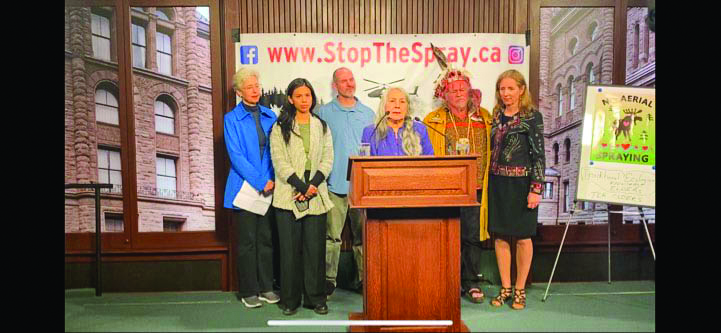TORONTO—On Earth Day, a powerful coalition of voices representing the Traditional Ecological Knowledge (TEK) Elders in the Robinson-Huron Treaty Territory gathered at Queen’s Park to advocate for the cessation of herbicide spraying in Ontario’s forests. Led by Elder Caroline Recollet of the Wahnapitae First Nation and Jo Bissaillion of the Serpent River First Nation, the group was joined by environmental advocates Joel Theriault of Stop the Spray Ontario, Mary Lou MacDonald from Safe Food Matters and Jessica Murray from Sierra Club.
While the area currently affected is the North Shore, due to the large swaths of Crown Land, Anishinaabe elders from Manitoulin Island such as Evelyn Roy of M’Chigeeng First Nation have joined the fight. “They are killing the animals; they are killing everything. Us too, and our medicines! Even some of our trees are dying. Trees are medicine too,” Ms. Roy, Anishnaabemowin language keeper, said.
“The propagation of monocultures on the nearby North Shore can cause issues with pests and diseases that could become problematic to adjacent ecosystems, so this conversion to plantations is opening issues for all forests in the region,” Jodi Koberinski, assistant to Elder Recollet, told The Expositor.
Their collective mission was to deliver a resounding message to Ontario policymakers: it’s time to “Stop the Spray.” At the heart of their campaign is a plea to end the use of glyphosate-based herbicides, which have been wreaking havoc on the delicate ecosystems of Anishinaabek forests along the north shore of Lake Ontario for over a decade.
“Ontario has an obligation to respect our Treaty rights,” said Elder Caroline Recollet. “When forests are converted to plantations, all life is affected—we share these lands with all of Creation.”
Elders have witnessed firsthand the devastating impact of herbicide use on the region’s biodiversity. As Jack pine plantations replace diverse forests, wildlife populations, including moose, deer, muskrat and countless others have suffered. “Ontario has an obligation to respect our Treaty rights,” emphasized Elder Caroline Recollet. “When forests are altered, it disrupts the balance of life for all beings with whom we share these lands.”
Nickel Belt MPP France Gélinas echoed the Elders’ concerns by formally presenting the petition in the legislature. The petition, which garnered thousands of signatures, was spearheaded by Joel Theriault of Stop the Spray Ontario, a bush pilot who has witnessed the alarming transformation of Ontario’s forests firsthand. “You can see it from the air, you can also see it from the ground. Everything’s dead except for the pine trees,” Mr. Theriault lamented.
Mary Lou MacDonald of Safe Food Matters added a legal perspective to the discussion, highlighting their ongoing court battles against the re-authorization of glyphosate-based herbicides. As a lawyer, MacDonald emphasized the lack of scientific basis for forest spraying and the inherent risks it poses to the safety of forest foods.
The gathering at Queen’s Park symbolizes a united front in the fight to protect Ontario’s forests and uphold the rights of Indigenous communities. With voices from diverse backgrounds joining forces, the call to “Stop the Spray” grows louder, resonating across the province and beyond.






